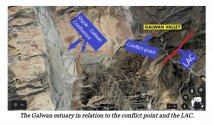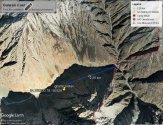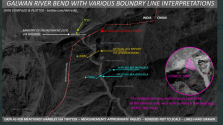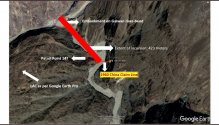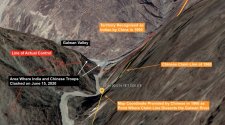Our Syndicate analysis of where is Eurasia heading; Quad may trigger eEpoch making changes in how SCO will function in future.
With the Quad’s virtual meet between leaders from the US, Australia, Japan and India, the Indo-Pacific debate has surfaced again with a calendar of activities lined up till the end of 2021. As a follow up, there was a media blitz in western mainstream media. Washington Post published back-to-back joint Op-eds by senior leaders, one by Joe Biden, Narendra Modi, Scott Morrison and Yoshihide Suga and the other by US Secretary of State Antony J Blinken and Secretary of Defence General Lloyd J Austin.
The underlying theme of both op-eds was Quad’s future trajectory on how to contain China in the region.
The initial part of the first op-ed is an affirmation of the Quad leadership being committed to a shared vision for an Indo-Pacific region that is free, open, resilient and inclusive. The group is striving to ensure that the Indo-Pacific is accessible and dynamic, governed by international law and bedrock principles such as freedom of navigation and peaceful resolution of disputes, and that all countries are able to make their own political choices, free from coercion. In recent years, that vision has increasingly been tested.
The second part of the op-ed invites regional players by describing the Quad as a flexible group of like-minded partners dedicated to advancing a common vision and to ensuring peace and prosperity. The grouping will welcome and seek opportunities to work with all of those who share in those goals.
While the first op-ed was softly written, without mentioning China in a hostile tone, the second op-ed by the Secretaries of State and Defence penned by Antony Blinken and General Austin was more substantive and harsh.
It stated that US-led alliances are what the military calls “force multipliers.” No country on Earth has a network of alliances and partnerships like the US. It would be a huge strategic error to neglect these relationships.
The op-ed quotes President Biden who stated that the world is at an inflection point. A fundamental debate is underway about the future—and whether democracy or autocracy offers the best path forward. It’s up to the US and other democracies to come together and show the world that they can deliver.
In the second part of the op-ed, the secretaries open up by stating, ‘not all countries share this vision. Some seek to challenge the international order—that is, the rules, values and institutions that reduce conflict and make cooperation possible among nations. As countries in the region and beyond know, China in particular is all too willing to use coercion to get its way. Here again, we see how working with our allies is critical. Our combined power makes us stronger when we must push back against China’s aggression and threats. Together, we will hold China accountable when it abuses human rights in Xinjiang and Tibet, systematically erodes autonomy in Hong Kong, undercuts democracy in Taiwan or asserts maritime claims in the South China Sea which violate international law. If we don’t act decisively and lead, Beijing will’.
This sounds familiar to the Cold War rhetoric and what was being propagated by Western allies before launching the Global War on Terror to target so-called ‘Political Islam’. In the sixties, the bogey was the Soviet Union, in the 90s’, it became political Islam and in the 21st Century it has become China.
Although Chinese Global times responded to these hostile assertions, there is a need for a larger debate on how the Quad will affect the future of SCO and Eurasia.
The Lowy Institute of Australia feels that cracks between India and SCO members have already started appearing. In a March 3 article with the title ‘Cracks beginning to appear in the Russia-India relationship’, the author suggests a shift in perceptions in both Russia and India. ‘India’s annual summit with Russia was cancelled last year for the first time since its inception—the official reason, as was commonly blamed for many abandoned events, Covid-19. The summit’s cancellation was a rare hiccup in what has otherwise been a traditionally close partnership’. It goes on to highlight that ‘Covid-19 could also be a convenient excuse to mask what is likely to be Russia’s growing unease about India’s deepening security ties with the US, especially New Delhi’s active participation in the Quadrilateral Security Dialogue, aka the “Quad”.
While discussing the challenges faced by Russia and India, the Lowy Institute article states that ‘in Moscow’s view, the Quad undermines Russian interests on several fronts. Moscow has favored a Russia-India-China (RIC) trilateral formative to advance a variety of security and diplomatic objectives—ranging from the normative promotion of the inviolability of state sovereignty to the pursuit of a more multi-polar, less US-dominated global governance and security architecture’.
There is another aspect of Quad that has not been discussed in mainstream Chinese and Russian media, the element of Neo-colonialism. Interestingly Quad has four members, one is an erstwhile colony and three are erstwhile colonizers. India has suffered under British colonial rule before independence, no wonder Nehru’s non-alignment policy had a historical and psychological factor attached to it. Today India seems to be abandoning emerging Asian powers to side with the neo-colonial powers like the US, Japan and Australia.
The Eurasian brotherhood, so dear to President Putin and President Xi, aims at throwing the yolk of colonialism and uniting the geographically contiguous Eurasia for shared economic development and regional security.
In one of our articles published by the Nation in September 2018, we had argued that the potential of Eurasia and SCO was enormous and it has a promise of a shared destiny. A few extracts of that article are being reproduced, as they remain relevant even today:
With 55,000,000 square kilometres of land mass, Eurasia covers around 37 percent of the Earth’s total land area including 5 billion people, which translates to 70 percent of global population.
The 21st century is a century of global connectivity, China and Russia are actively working to connect the globe through a system of land and maritime routes, on the other hand, the old globalists led by the West, who thrived on the creation of blocs, division of regions and the creation of shatter zones and barrier belts, are trying hard to create a fear of the rise of new powers so as to maintain the status quo.
Science and technology developments, especially in the field of infrastructure and material sciences have made it possible to surmount physical and geographic challenges, bringing down strategic barriers. There is a need to review the potential of connectivity and geographic proximity within Eurasia and Africa to develop a framework of global peaceful coexistence, economic development and interaction between various nations, civilizations and societies.
To conclude, India joining the Quad has raised alarm bells in Eurasia and the SCO; we are sure every Indian move is being closely watched and analysed by Moscow and Beijing. Is India going to become the odd man out in SCO—only time will tell.

